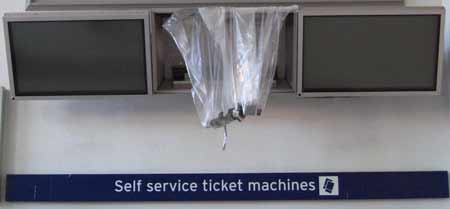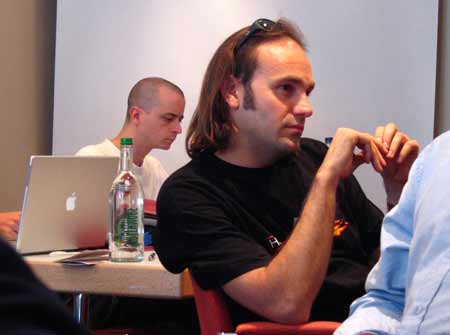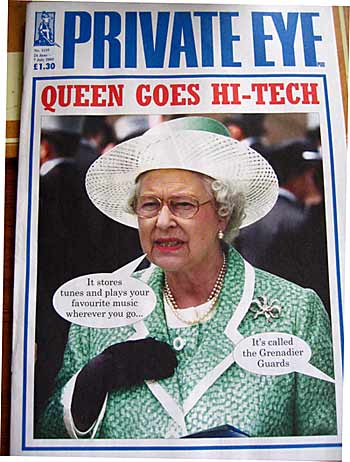
Not really. Just a pic from a curious Japanese site explaining how to bullet-proof your iPod. Nice metalwork, though. Thanks to Dave Hill for the link.


Not really. Just a pic from a curious Japanese site explaining how to bullet-proof your iPod. Nice metalwork, though. Thanks to Dave Hill for the link.
In an extraordinary presentation last week, Michael D. Gallagher, Assistant Secretary at the National Telecommunications and Information Administration (NTIA), outlined new “US principles” regarding the internet’s Domain Name System. They are:
1. The United States Government intends to preserve the security and stability of the Internet’s Domain Name and Addressing System (DNS). Given the Internet’s importance to the world’s economy, it is essential that the underlying DNS of the Internet remain stable and secure. As such, the United States is committed to taking no action that would have the potential to adversely impact the effective and efficient operation of the DNS and will therefore maintain its historic role in authorizing changes or modifications to the authoritative root zone file.
2. Governments have legitimate interest in the management of their country code top level domains (ccTLD). The United States recognizes that governments have legitimate public policy and sovereignty concerns with respect to the management of their ccTLD. As such, the United States is committed to working with the international community to address these concerns, bearing in mind the fundamental need to ensure stability and security of the Internet’s DNS.
3. ICANN is the appropriate technical manager of the Internet DNS. The United States continues to support the ongoing work of ICANN as the technical manager of the DNS and related technical operations and recognizes the progress it has made to date. The United States will continue to provide oversight so that ICANN maintains its focus and meets its core technical mission.
4. Dialogue related to Internet governance should continue in relevant multiple fora. Given the breadth of topics potentially encompassed under the rubric of Internet governance there is no one venue to appropriately address the subject in its entirety. While the United States recognizes that the current Internet system is working, we encourage an ongoing dialogue with all stakeholders around the world in the various fora as a way to facilitate discussion and to advance our shared interest in the ongoing robustness and dynamism of the Internet. In these fora, the United States will continue to support market-based approaches and private sector leadership in Internet development broadly.
Translation:
1. We don’t trust anybody else to run the Internet’s Root Servers, so we’ll continue to do it, thank you very much.
2. Other countries can do what they like with their national domains, so long as they accept Principle 1.
3. ICANN can manage the technical details and do the donkey work.
4. The UN has no serious role to play in any of this.
Just think: you have a nice business making great products, which are highly valued by their users. And then, one day, some terrorists hijack aircraft and fly them into tall buildings. And the next day, demand for your product falls to, well, nearly zero. Lovely, quirky Guardian piece by Luke Harding on the fortunes of the company that makes the Swiss army knife.
I’ve carried a SAK for as long as I remember. When the wonderful Knock airport opened in the 1980s, I was an early user. Once, a young, enthusiastic security guard spotted the knife in the tray alongside my loose change and watch as I was going through the metal-detection barrier. “I’m sorry, Sir”, he said officiously, “but you cannot take that on the plane”. Needless to say, I protested, and eventually my knife was solemnly handed over to a RyanAir stewardess, who placed it in a drawer on the plane and handed it back to me at Luton after we landed! Ah, the good old days…
(Which reminds me…) On another occasion, I landed at Knock late on a Sunday evening and went to the car hire desk to pick up the car I had booked. “I’m pleased to tell you”, said the chap behind the desk, “that you’ve been upgraded”.
“Wow!”, said I, “so what have I got?”
“A Nissan Micra.”
“But I ordered a Micra”
“Ah yes”, he said, “but this one’s an automatic!”
Well, well. From today’s New York Times…
After years of avoiding it, Hollywood studios are preparing to let people download and buy electronic copies of movies over the Internet, much as record labels now sell songs for 99 cents through Apple Computer’s iTunes music store and other online services.
[…]
The studios have been working for months to confront the technological and business challenges of digital sales. Those initiatives gained new urgency on June 27 when the Supreme Court ruled that companies distributing software that allows users to trade pirated copies of audio and video files are liable for copyright infringement only if they induce users to break the law.
Sony, for example, is converting 500 movie titles to a digital format that can be downloaded and sold. Universal Pictures, a unit of NBC Universal, which is 80 percent owned by General Electric and 20 percent owned by Vivendi Universal, is preparing nearly 200 titles for digital online sale. And Warner Brothers, a division of Time Warner, says it has already digitized most of its library of 5,000 films and will start selling some of them online later this year.
Last week, Apple trumpeted its support of podcasting with a technically misleading but undeniably catchy tag line: “Podcasting. The next generation of radio.”
At the same time, Audible brought out its own print ad: “Audible.com announces a revolutionary breakthrough in podcasting. Profit.”
Randall Stross, writing in the New York Times about Apple’s incorporation of podcasts into iTunes.
This morning’s Observer column mulling over the Grokster decision. Conclusion:
Thus we have a strangely paradoxical outcome. The movie studios and record companies have apparently won a famous legal victory in their war against file-sharing. But the main consequence of this victory will be to drive file-sharers to use P2P software that is not only much more powerful than anything Grokster and StreamCast could contrive, but also looks immune to legal challenges. If this is victory, can you imagine what defeat would be like?

Cambridge station, July 1, 2005. In the end, they’ll come round to the idea of installing Linux. To save embarrassment in the meantime, a kind friend has offered to make some nice embroidered covers for the screens.

Mark Shuttleworth and a colleague at the Edubuntu Summit in London on July 1. Great event. Great project.

One of the most sinister arguments used by proponents of the ID Card bill (and other measures proposed by security freaks) is the canard that “if you’ve got nothing to hide then you have nothing to fear”. There’s a lovely piece by Muriel Gray in today’s Guardian which shows how wrong this cant can be. Sometimes, innocent people have very good reasons for wanting to maintain absolute privacy.